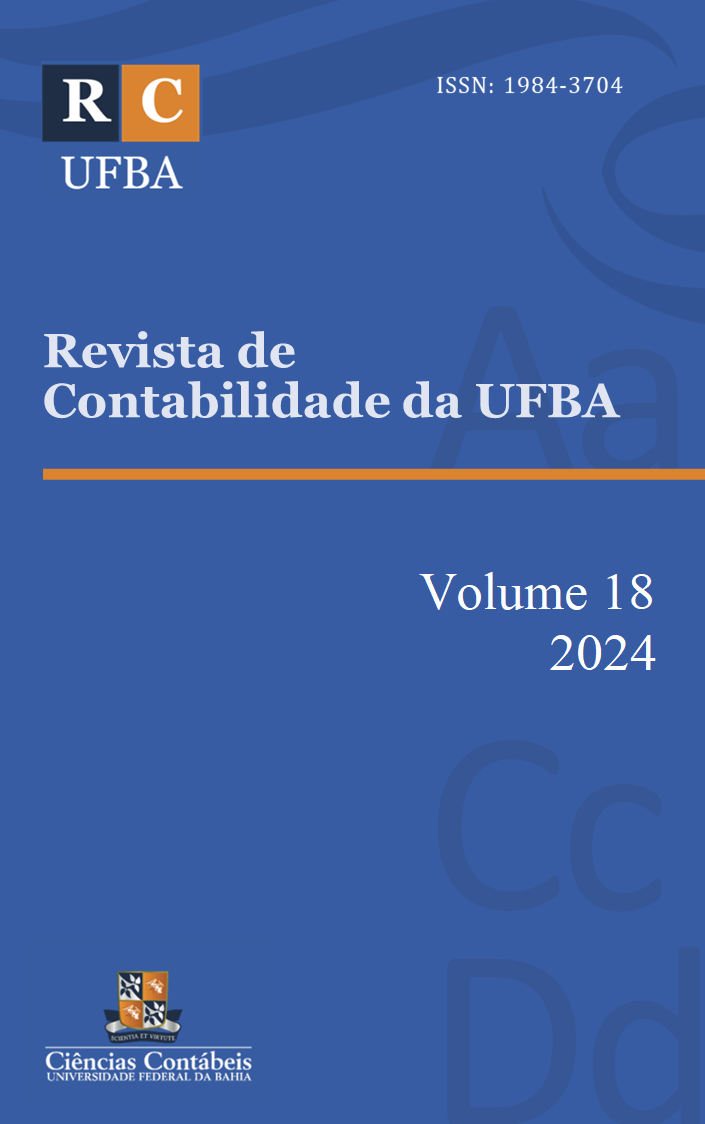Do Financial Institutions Practice Less Tax Avoidance than Other Companies?
DOI:
https://doi.org/10.9771/rcufba.v18i1.62986Keywords:
Tax Avoidance, Financial Institutions, Non-Financial InstitutionsAbstract
This study investigates whether financial institutions engage in greater tax aggressiveness compared to other sectors, addressing a significant gap in the literature by exploring sector-specific tax behaviors and their broader implications. The hypothesis suggests that financial institutions exhibit lower GAAP ETRs (Generally Accepted Accounting Principles Effective Tax Rates) and CASH ETRs (Cash Effective Tax Rates) than non-financial companies. Using a robust dataset of 131,204 firm-year observations from publicly traded U.S. companies between 2000 and 2022, sourced from the Compustat database, the study employs advanced regression methods, including quantile regression, to analyze these dynamics. While traditional regression results indicate no significant difference in tax avoidance between financial and non-financial firms, quantile regression uncovers critical nuances. At higher levels of tax avoidance, financial institutions are less likely to engage in aggressive practices. The findings offer significant contributions to public policy by highlighting the role of reputational factors in moderating tax behaviors, providing policymakers with insights for designing regulations that balance tax compliance and competitiveness. For education, this study introduces real-world examples of sector-specific tax strategies, enabling educators to incorporate these findings into accounting and finance curricula to better prepare students for challenges in corporate governance and fiscal policy.
Downloads
References
Atwood, T. J., Drake, M. S., Myers, J. N., & Myers, L. A. 2012. Home country tax system characteristics and corporate tax avoidance: International evidence. Accounting Review, 87(6), 1831-1860. https://doi.org/10.2308/accr-50222.
Chyz, J. A, & Gaertner, F. B. 2018. Can paying “too much” or “too little” tax contribute to forced CEO turnover? Accounting Review, 93(1), 103-130. https://doi.org/10.2308/accr-51767.
Clout, V., Falta, M., & Willett, R. J. 2015. Fundamental relations between market and accounting values fundamental relations between market and accounting values. Working Paper.
Desai, M. A., & Dharmapala, D. 2008a. Corporate tax avoidance and firm value. The Review of Economics and Statistics, 91(3), 537-546. https://doi.org/10.1162/rest.91.3.537.
Desai, M. A., & Dharmapala, D. 2008b. Tax and Corporate Governance: An Economic Approach. MPI Studies on Intellectual Property, Competition and Tax Law, vol 3. Springer, Berlin, Heidelberg.
Desai, M. A., Dyck, A., & Zingales, L. 2007. Theft and taxes. Journal of financial Economics, 84(3), 591-623. https://doi.org/10.1016/j.jfineco.2006.05.005.
Dyreng, S. D., Hanlon, M., & Maydew, E. L. 2008. Long-Run Corporate Tax Avoidance. The Accounting Review, 83(1), 61-82. https://doi.org/10.2308/accr.2008.83.1.61.
Gallemore, J., Gipper, B., & Maydew, E. L. (2019). Financial institutions as tax planning intermediaries. Journal of Accounting Research, 57(1), 169–209. https://doi.org/10.1111/1475-679X.12246
Hanlon, M., & Heitzman, S. 2010. A review of tax research. Journal of Accounting and Economics Economics, 50(2-3), 127-178. https://doi.org/10.1016/j.jacceco.2010.09.002.
Hamilton, B. H., & Nickerson, J. A. 2003. Correcting for endogeneity in strategic management research. Strategic Organization, 1, 51-78. https://doi.org/10.1177/1476127003001001218.
Hanlon, M., & Slemrod, J. 2009. What does tax aggressiveness signal? Evidence from stock price reactions to news about tax shelter involvement. Journal of Public Economics, 93, 126-141. https://doi.org/10.1016/j.jpubeco.2008.09.004.
Hasan, I., Hoi, C. K. (Stan), Wu, Q., & Zhang, H. 2014. Beauty is in the eye of the beholder: The effect of corporate tax avoidance on the cost of bank loans. Journal of Financial Economics, 113(1), 109-130. https://doi.org/10.1016/j.jfineco.2014.03.004.
Khan, M., Srinivasan, S., & Tan, L. 2017. Institutional ownership and corporate tax avoidance: New evidence. The Accounting Review, 92(2), 101-122. https://doi.org/10.2308/accr-51529.
Koenker, R. 2004. Quantile regression for longitudinal data. Journal of Multivariate Analysis, 91, 74–89. https://doi.org/10.1016/j.jmva.2004.05.006.
Koenker, R., Bassett, G., & Jan, N. 2007. Regression Quantiles. Econometrica, 46(1), 33- 50.
Lanis, R., Richardson, G., Liu, C., & McClure, R. 2019. The Impact of Corporate Tax Avoidance on Board of Directors and CEO Reputation. Journal of Business, 160 (1), 463–498. https://doi.org/10.1007/s10551-018-3949-4.
Lobo, G. J. 2017. Accounting research in banking – A review. China Journal of Accounting Research, 10(1), 1–7. http://dx.doi.org/10.1016/j.cjar.2016.09.003.
Minnick, K., & Noga, T. 2010. Do corporate governance characteristics influence tax management? Journal of Corporate Finance, 16(5), 703-718. https://doi.org/10.1016/j.jcorpfin.2010.08.005.
Özbay, D., Adıgüzel, H., & Karahan Gökmen, M. (2023). Corporate social responsibility and tax avoidance: Channeling effect of family firms. Journal of Corporate Accounting & Finance, 34(3), 11-30. https://doi.org/10.1002/jcaf.22610
Rego, S. O. 2003. Tax-Avoidance Activities of U.S. Multinational Corporations. Contemporary Accounting Research, 20(4), 805-833. https://doi.org/10.1506/VANN-B7UB-GMFA-9E6W.
Rego, S. O., & Wilson, R. 2012. Equity Risk Incentives and Corporate Tax Aggressiveness. Journal of Accounting Research, 50(3), 775-810. https://doi.org/10.1111/j.1475-679X.2012.00438.x
Shackelford & Shevlin. 2001. Empirical tax research in accounting: A discussion. Journal of Accounting and Economics, 31(1-3), 389-403. https://doi.org/10.1016/S0165-4101(01)00021-0.
Walter, I. 2016. Reputational risks and large international financial institutions. Financial Markets and Portfolio Management, 30(1), 1–17. https://DOI 10.1007/s11408-016-0264-x.
Yahaya, M. B., Oon, E. Y. N., & Jusoh, R. (2024). CEO Duality and Bank Tax Avoidance: The Moderating Role of Risk Committees-An International Evidence. Finance a Uver: Czech Journal of Economics & Finance, 74(1). https://doi.org/10.32065/CJEF.2024.01.03
Zimmerman, J. 1983. Taxes and Firm size. Journal of Accounting Economics, 5, 119-149. https://doi.org/10.1016/0165-4101(83)90008-3
Downloads
Published
How to Cite
Issue
Section
License
Copyright (c) 2024 Revista de Contabilidade da UFBA

This work is licensed under a Creative Commons Attribution-NonCommercial 4.0 International License.
Autores que publicam nesta revista concordam com os seguintes termos:- Autores mantém os direitos autorais e concedem à revista o direito de primeira publicação, com o trabalho licenciado simultaneamente sob uma Licença Creative Commons Attribution CC-BY-NC após a publicação, permitindo o compartilhamento do trabalho com reconhecimento da autoria do trabalho e publicação inicial nesta revista.
- Autores têm autorização para assumir contratos adicionais separadamente, para distribuição não-exclusiva da versão do trabalho publicada nesta revista (ex.: publicar em repositório institucional ou como capítulo de livro), com reconhecimento de autoria e publicação inicial nesta revista.
- Autores têm permissão e são estimulados a publicar e distribuir seu trabalho online (ex.: em repositórios institucionais ou na sua página pessoal), já que isso pode gerar alterações produtivas, bem como aumentar o impacto e a citação do trabalho publicado.












 This work is licensed under a license
This work is licensed under a license 